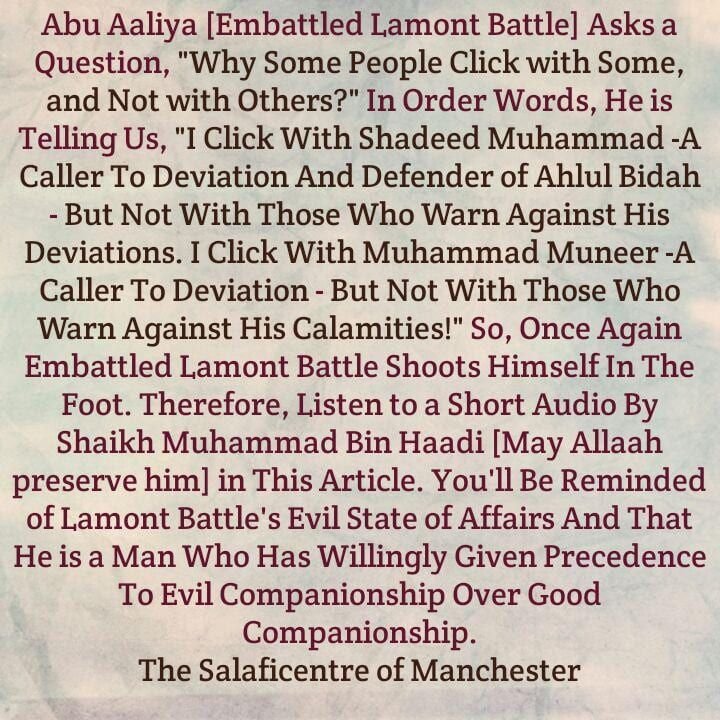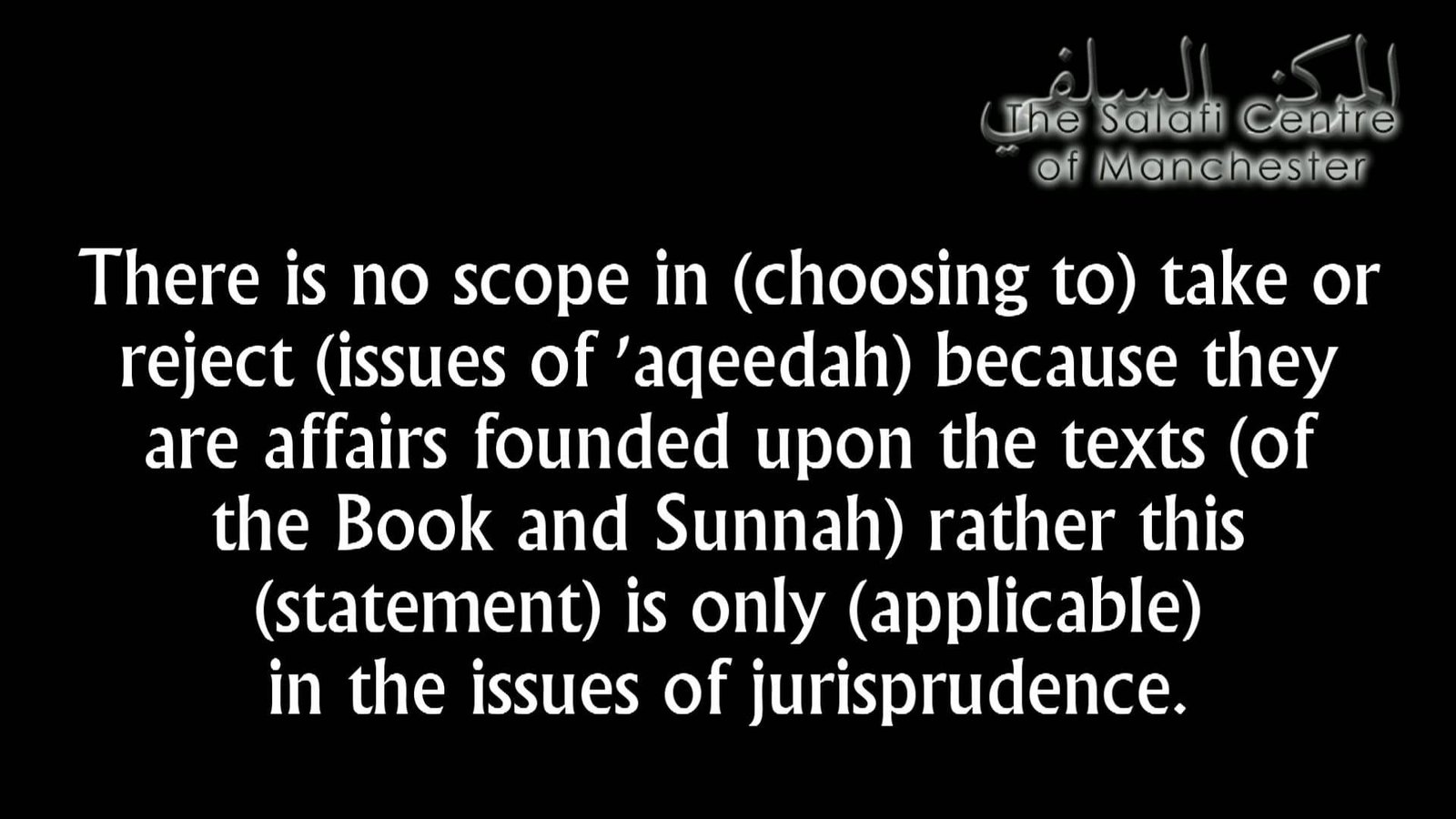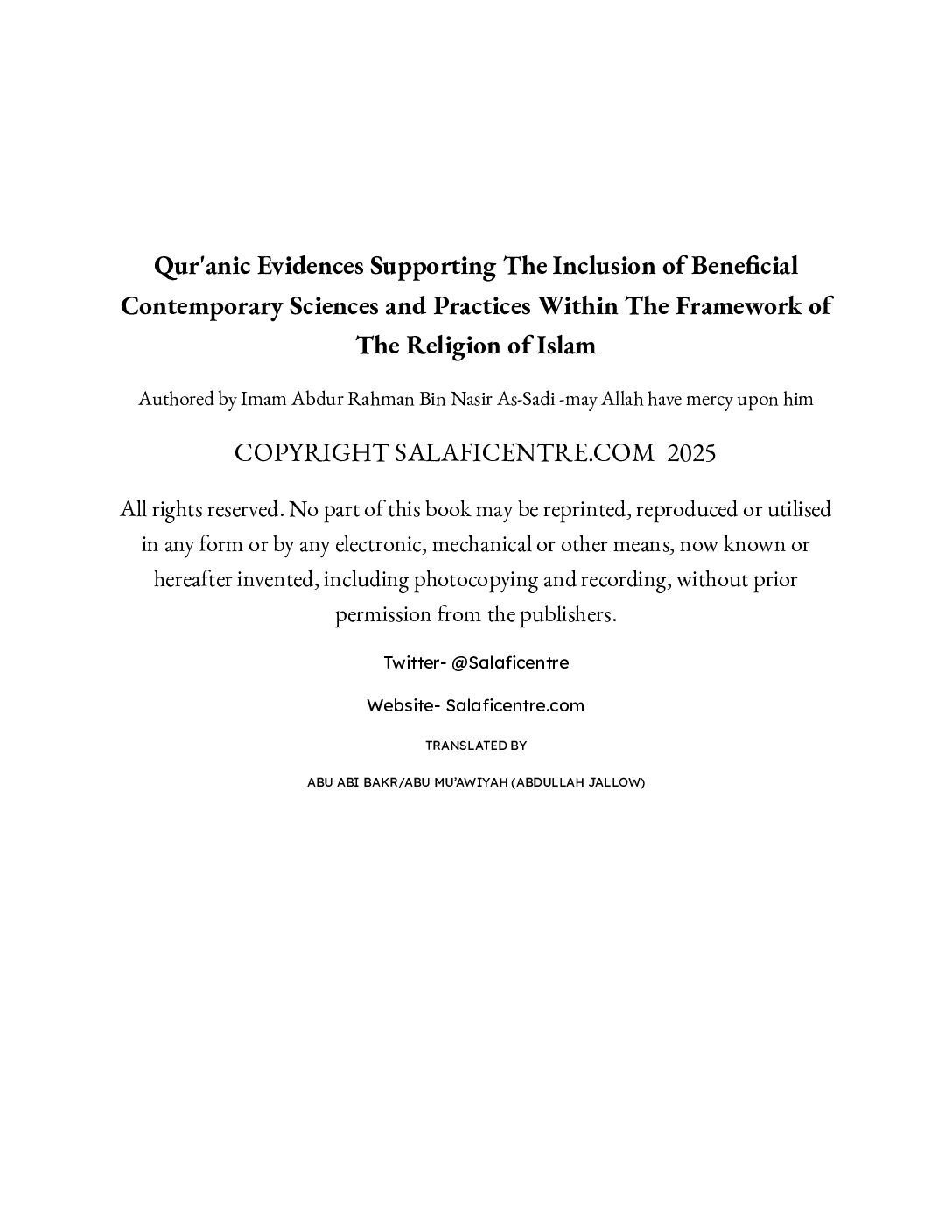[Part 2] Observations on some of the inappropriate statements of Okasha Abdallaah–A Baseless and Evil Comparison
Allaah (The Most High) said:
يَا أَيُّهَا الَّذِينَ آمَنُوا كُونُوا قَوَّامِينَ لِلَّهِ شُهَدَاءَ بِالْقِسْطِ ۖ وَلَا يَجْرِمَنَّكُمْ شَنَآنُ قَوْمٍ عَلَىٰ أَلَّا تَعْدِلُوا ۚ اعْدِلُوا هُوَ أَقْرَبُ لِلتَّقْوَىٰ ۖ وَاتَّقُوا اللَّهَ ۚ إِنَّ اللَّهَ خَبِيرٌ بِمَا تَعْمَلُونَ
”O you who believe! Stand out firmly for Allah and be just witnesses and let not the enmity and hatred of others make you avoid justice. Be just: that is nearer to piety, and fear Allah. Verily, Allah is Well-Acquainted with what you do.” [Soorah Al-Maa-idah: Ayah:8]
Yaa Okasha! when we look at the shortest commentary on this above ayah, we find the likes of Imaam as-Saa’di (rahimahullaah) saying that we have been commanded to be active in establishing justice in all our apparent and unapparent actions, and that we should establish justice for the sake of Allaah alone and not for any worldly gain; rather our goal should be the accomplishment of justice, and this justice neither contains excess nor falling short in statements and actions.
This justice is to be established for a relative, a non- relative, a friend and an enemy of ours. And we should not allow our hatred of a people to lead us to injustice, because this is an action of one who does not act with justice; rather establishment of justice necessitates testimony for or against an ally; and testimony for or against an enemy, even if he were a disbeliever or an innovator. It is incumbent to establishment justice and it is impermissible to reject the truth even if an enemy utters it, because that would be a violation against truth. Indeed every time we establish justice our hearts are drawn closer to fear of Allaah in carrying out what He has commanded and keeping away from what He has forbidden. Yaa Okasha! We are quite sure that you are able to refer to the various explanations of the scholars to be reminded of what we have paraphrased above.
Yaa Okasha! You know very well who Abu Lahab was; so how can you say that there are those adversaries of yours ascribing to salafiyyah in Philadelphia who behave like Abubakr (radiyallaahu-anhu) during the day and like Abu lahab at night!
Yaa Okasha! We all know that Abu Lahab was an uncle of the Prophet (sallal-laahu-alayhi-wasallam), but he was one of the severest in his enmity towards our beloved Prophet (sallal-laahu-alayhi-wasallam). We all know that when our beloved Prophet used to call the people to believe and testify that none has the right to be worshipped except Allaah, Abu lahab used to tell the people that the Prophet is a liar. (see hadeeth reported by Ahmad: 4/341 declared saheeh by shaikh Muqbil in Al-Jaami-us Saheeh Mimmaa Laysah Fis-Saheehayn: 1/52, 53] He was severe in disbelief and severe in harming the Prophet; so Allaah disgraced him in this worldly life and the next. He was wretched in this worldly life and has been promised an eternal residence in the hell fire in the afterlife. He was neither successful in this life nor will he be successful in the hereafter. He will be surrounded by the fire from all sides. Allaah revealed a complete Soorah about him that is recited both in the loud and silent prayers and the believer is rewarded for such recitation. When one refers to the explanations of Soorah Al-Masad, he/she finds the likes of what we have mentioned. This is Abu lahab’s affair in brief, so how can you make a resemblance of him to those adversaries of yours in Philadelphia who ascribe to Salafiyyah. Indeed, we will all be held accountable for our statements. Allaah (The Most High) said:
وَلَقَدْ خَلَقْنَا الْإِنسَانَ وَنَعْلَمُ مَا تُوَسْوِسُ بِهِ نَفْسُهُ ۖ وَنَحْنُ أَقْرَبُ إِلَيْهِ مِنْ حَبْلِ الْوَرِيدِ
إِذْ يَتَلَقَّى الْمُتَلَقِّيَانِ عَنِ الْيَمِينِ وَعَنِ الشِّمَالِ قَعِيدٌ
مَّا يَلْفِظُ مِن قَوْلٍ إِلَّا لَدَيْهِ رَقِيبٌ عَتِيدٌ
”And indeed We have created man, and We know what his ownself whispers to him. And We are nearer to him than his jugular vein (by Our Knowledge). (Remember!) that the two receivers (recording angels) receive (each human being after he or she has attained the age of puberty), one sitting on the right and one on the left (to note his or her actions). Not a word does he (or she) utter, but there is a watcher by him ready (to record it).” [Qaaf: Ayah: 16-18]
Shameet Bin Ajlaan (rahimahullaah) said:
”O son of Aadam: Indeed, you do not keep silent except that you are safe; but be careful when you do speak, because it will either be for or against you.” [Jaami-ul Uloom Wal-Hikam: page: 144]
Yaa Okasha! Apologize to your brothers for uttering such a statement against them. We ask Allaah for ikhlaas, thabaat, istiqaamah and sidq.
Part 3 to follow inshaa-Allaah [A Manhaj discussion with brother Okasha]





